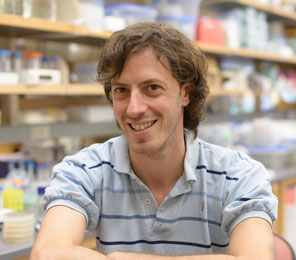 |
|
| Juan I. Fuxman Bass, PhD | |
Juan I. Fuxman Bass, PhD, a post-doctoral scholar at UMass Medical School, was named a 2012 Pew Latin American Fellow in the Biomedical Sciences today by The Pew Charitable Trusts. The program provides support for young scientists from Latin America to pursue postdoctoral training in the United States and establish their own labs upon returning to their home countries. Dr. Fuxman Bass joins 10 other researchers named to this year’s class.
These scientists have dedicated their careers to finding solutions for some of the world’s most troubling health problems. This fellowship will provide support that will further their research, enable them to work with colleagues in the United States, and increase scientific knowledge throughout their home region. While the number of foreign doctorate recipients staying in the United States has never been higher—more than 60 percent according to the National Science Foundation—more than 70 percent of Pew Latin American Fellows return to their country to help build the scientific infrastructure throughout the hemisphere.
“Being named a Pew Latin American Fellow is a tremendous honor and a huge opportunity for me,” said Fuxman Bass, a postdoctoral scholar in the lab of Marian Walhout, PhD, professor of molecular medicine and co-director of the Program in Systems Biology, where he is studying the complex, cell-to-cell communication system that the immune system uses to tailor its defense against pathogens. “There aren’t many labs working on systems biology in Argentina. This fellowship provides the training and start-up funding I’ll need to establish my own lab and advance the field of systems biology in Argentina.”
To coordinate an effective defense against pathogens, immune cells communicate with each other by releasing chemical signals called cytokines. The production of these signals is tightly regulated by the immune system and is greatly dependent on other proteins called transcription factors (TF) that dictate where and when cytokine genes are expressed. Inappropriate release of cytokines has been associated with several diseases including many cancers, autoimmune diseases and immune deficiencies. Using an innovative combination of computational and experimental technology, Fuxman Bass is working to identify the network of transcription factors that interact with all the genes that encode human cytokines and assess how loss of these factors affects their production. Fully understanding the complex system of cytokine production could lead to new treatments for cancer, infection and autoimmune diseases.
“I’m working to assemble and characterize a cytokine gene regulatory network by identifying the transcription factors that regulate cytokine genes using a new experimental platform developed in the Walhout lab called enhanced yeast one-hybrid,” said Fuxman Bass. “This work will greatly contribute to the understanding of cytokine regulation during immune responses and will provide a framework to identify new therapeutic targets for multiple immune related diseases.”
“Juan is an exceptional scientist who has made significant contributions in the lab to our understanding of systems biology,” said Dr. Walhout. “This award is a reflection of his outstanding work and is well deserved.”
Fuxman Bass, who received a doctorate in biology from the University of Buenos Aires in 2010, is the first UMass Medical School scientist to be named a Pew Latin American Fellow. The program provides a stipend in each of two years for postdoctoral training in the United States and an additional $35,000 payment when the fellow returns to Latin America for the purchase of supplies and equipment to help establish his/her independent laboratory. The program was launched in 1991 to help develop and advance the scientific network of highly trained researchers and to foster collaboration between scientists in Latin America and the United States. To date, Pew has dedicated more than $18 million in direct support for more than 212 Latin American Fellows.
The Latin American Fellow initiative is run by the The Pew Charitable Trusts, which also directs the Pew Scholars in the Biomedical Sciences, a program that for 27 years has supported promising U.S. scientists early in their careers. Past UMMS Pew Scholars Program recipients include:
- 2011: Thomas Fazzio, PhD, assistant professor of molecular medicine;
- 2010: David Guertin, PhD, assistant professor of molecular medicine;
- 2005: Lambertus van den Berg, PhD, associate professor of molecular medicine;
- 2000: Phillip D. Zamore, PhD, Howard Hughes Medical Institute Investigator, the Gretchen Stone Cook Chair of Biomedical Sciences and professor of biochemistry & molecular pharmacology;
- 1995: Craig C. Mello, PhD, 2006 Nobel Laureate, Howard Hughes Medical Institute Investigator, Blais University Chair in Molecular Medicine and distinguished professor of molecular medicine and cell biology; and
- 1992: John M. Leong, MD, PhD, professor of microbiology & physiological systems.